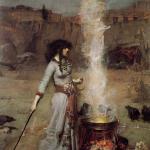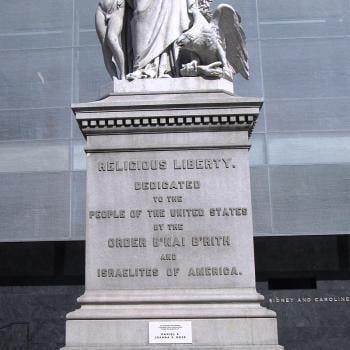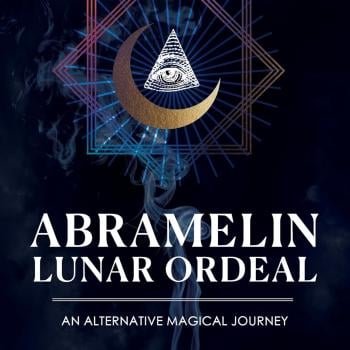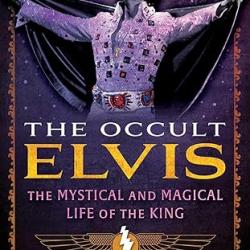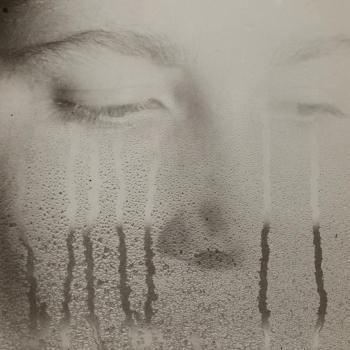The oath (hórkos), is “a solemn declaration placed under the guarantee of a superhuman power that is charged with the punishment of perjury. … One could define an oath as an anticipated ordeal. The one taking the oath stakes something that is essential to him, some material possession, his kin, even his own life, in order to guarantee the veracity of his affirmation. … In the Homeric language hórkos designates every kind of oath: the type which gives a guarantee of what one is going to do, a pact; or else the type which supports a statement relating to the past, the so-called judiciary oath.”
“In the institution of the oath, religion, morality, and the very organization of society appear indissolubly linked together. Its function is to guarantee that a statement is absolutely binding, whether it be a statement about something in the past or a declaration of intent for the future. In a culture without
writing where there are no records to act as proof, no legal documents, this function is of unique importance. Nevertheless, in the ancient high civilizations, the written word made only slow progress against the oath and never entirely displaced it. ‘What holds democracy together is the oath.’”
[Burkert, Walter. Greek Religion. p250]

The oath daimon hórkos
The Greeks personified hórkos as a sinister daimon (spirit), “a sanctifying object, one which has a potency which punishes every breach of the pledged word.”
According to Hesiod: “Hórkos is the worst of the scourges for every terrestrial man who knowingly shall have violated his oath”
Hesiod, Theog. 231-32
https://archive.chs.harvard.edu/CHS/article/display/3963.8-the-oath-in-greece
Hórkos was the personified spirit (daimon) of oaths who punished perjurers. He was the son of Eris (Strife), and the Erinyes (Furies) assisted at his birth. He was also a punitive companion of the goddess Dike (Justice).
“The better path is to go by on the other side towards justice; for Dike (Justice) beats Hubris (Outrage) when she comes at length to the end of the race. But only when he has suffered does the fool learn this. For Horkos (Oath) keeps pace with wrong judgements.”
Hesiod, Works and Days 218 ff :
“Beware of all the fifth days [of the month]; for they are harsh and angry; it was on the fifth, they say, that the Erinyes (Furies) assisted at the bearing of Horkos (Oath), whom Eris (Strife) bore, to be a plague on those who take false oath.”
Hesiod, Works and Days 804 ff :
https://www.theoi.com/Daimon/Horkos.html
Hesiod suggests that the fifth day of each lunar month is especially dangerous for perjurers, and this is echoed by Virgil:
“Luna (the Moon) [Selene] herself has ordained various days in various grades as lucky for work. Shun the fifth; then pale Orcus [Horkos] and the Eumenides [Erinyes] were born.”
[N.B. Virgil uses the Latin name Orcus for Horkos. Cf. Hesiod’s Works and Days 804ff above.]
Virgil, Georgics 1. 276 ff (trans. Fairclough) (Roman bucolic C1st B.C.) :
Aesop, however, suggests that any day can be dangerous:
“A certain man took a deposit from a friend but intended to keep it for himself. When the depositor then summoned him to swear an oath regarding the deposit, he realized the danger he was in and prepared to leave the city and go to his farm. When he reached the city gates, he saw a lame man who was also on his way out of town. He asked the man who he was and where he was going. The man said that he was the god named Horkos (Oath) and that he was on his way to track down wicked people. The man then asked Horkos (Oath) how often he revisited each city. Horkos replied, ‘I come back after forty years, or sometimes thirty.’
Accordingly, on the very next day the man did not hesitate to swear an oath that he had never received the deposit. But then the man ran into Horkos, who dragged him off to the edge of a cliff. The man asked Horkos how he could have said that he wasn’t coming back for another thirty years when in fact he didn’t even grant him a single day’s reprieve. Horkos explained, ‘You also need to know that if somebody intends to provoke me, I am accustomed to come back again the very same day.’”
Aesop, Fables 170 (from Chambry 298) (trans. Gibbs) (Greek fable C6th B.C.) :
https://www.theoi.com/Daimon/Horkos.html
Herodotus quotes the Pythian priestess in Delphi that the dangers of perjury extend to the entire family:
“Glaukos (Glaucus) [historical figure] journeyed to Delphoi (Delphi) to question the oracle. When he asked the oracle whether he should seize the money under oath [that is, money entrusted to him which he had sworn to return], the Pythian priestess threatened him in these verses:
‘Glaukos son of Epikydes, it is more profitable now to prevail by your oath and seize the money. Swear, for death awaits even the man who swears true. But Horkos (Horcus, Oath) has a son, nameless; he is without hands or feet, but he pursues swiftly, until he catches and destroys all the family and the entire house. The line of a man who swears true is better later on.’
When Glaukos heard this, he entreated the god to pardon him for what he had said. The priestess answered that to tempt the god and to do the deed had the same effect.”
Herodotus, Histories 6. 86c (trans. Godley) (Greek historian C5th B.C.)
https://www.theoi.com/Daimon/Horkos.html
Actual practice of an oath
“The oath consists in the invocation of extra-human witnesses, mostly gods, and in a ritual which is stamped with an irrevocable character and often imprints an unforgettable experience of terror. The ritual may involve grasping and casting away a staff or a stone; more memorable is the sinking of iron bars into the sea as an expression of utter irretrievability, as the Phocians did when they set out on their emigration and as the Ionians still did in 478 to seal their alliance against Persia. Generally the oath is
accompanied by an animal sacrifice and libation; the libation comes very much to the fore in the case of the armistice and the peace treaty which set an end to bloodshed; these are therefore known quite simply as spondai [libations].”
Typically, Zeus as the highest and strongest deity is prominently invoked in oaths as Zeus horkios. In addition,
“Athenians swear by Zeus, Apollo, and Demeter … Alternatively, they may swear by Zeus, Poseidon, and Demeter or by Zeus, Athena, Poseidon, and Demeter; … Aglauros … Hestia, the centre of the polis; the warrior gods, Enyo and Enyalios, Ares and Athena Areia … Thallo and Auxo, Sprouting and Growth, as protecting powers over adolescents: Hegemone, the Leader, and Herakles, the great prototype of the man who finds his way through the world on his own strength; and finally, ‘the boundaries of the fatherland, wheat, barley, vines, olives and fig-trees,’ epitomizing the fruitful, ancestral earth. From earliest times objects could be elevated to the status of witnesses to an oath; thus Achilles swears by his staff which will never again bear leaf, and Hera swears by the head of Zeus and her marriage bed.
The oath sacrifice shares essential elements with the normal animal sacrifice, but underlines the aspect of terror and destruction. The blood is first made to flow into a vessel and then the hands are plunged into the gore. Essential is the dismemberment of the victim: the person swearing the oath treads with his foot on the ‘severed parts’, namely, on the sexual organs of the male victim; bloodshed is compounded with the horror of castration. This is accompanied by an act of self-cursing: Whoever is the first to do wrong against the oath, let his brains flow to the ground like this wine,’ says
the Iliad. [3.299 f; 19.264 f] Later the customary imprecation is that utter destruction (exoleia) should befall the oath-breaker and his line; the extirpation of the family corresponds to the castration.”
Burkert, Walter. Greek Religion. p250-1
The Hippocratic Oath
Probably the best known oath from ancient Greece is the Hippocratic Oath, which is an oath of ethics historically taken by physicians.
“In its original form, it requires a new physician to swear, by a number of healing gods, to uphold specific ethical standards. The oath is the earliest expression of medical ethics in the Western world, establishing several principles of medical ethics which remain of paramount significance today. These include the principles of medical confidentiality and non-maleficence. … The original oath was written in Ionic Greek, between the fifth and third centuries BCE.”
The oldest partial fragments of the oath date to circa 275 CE. The oldest extant version dates to roughly the 10th–11th century, held in the Vatican Library. It does not explicitly contain the phrase “First do no harm” which is often attributed to it. However, similar intentions are vowed by, “I will abstain from all intentional wrong-doing and harm”.
“I swear by Apollo Healer, by Asclepius, by Hygieia, by Panacea, and by all the gods and goddesses, making them my witnesses, that I will carry out, according to my ability and judgment, this oath and this indenture.
To hold my teacher in this art equal to my own parents; to make him partner in my livelihood; when he is in need of money to share mine with him; to consider his family as my own brothers, and to teach them this art, if they want to learn it, without fee or indenture; to impart precept, oral instruction, and all other instruction to my own sons, the sons of my teacher, and to indentured pupils who have taken the Healer’s oath, but to nobody else.
I will use those dietary regimens which will benefit my patients according to my greatest ability and judgment, and I will do no harm or injustice to them.[6] Neither will I administer a poison to anybody when asked to do so, nor will I suggest such a course. Similarly I will not give to a woman a pessary to cause abortion. But I will keep pure and holy both my life and my art. I will not use the knife, not even, verily, on sufferers from stone, but I will give place to such as are craftsmen therein.
Into whatsoever houses I enter, I will enter to help the sick, and I will abstain from all intentional wrong-doing and harm, especially from abusing the bodies of man or woman, bond or free. And whatsoever I shall see or hear in the course of my profession, as well as outside my profession in my intercourse with men, if it be what should not be published abroad, I will never divulge, holding such things to be holy secrets.
Now if I carry out this oath, and break it not, may I gain for ever reputation among all men for my life and for my art; but if I break it and forswear myself, may the opposite befall me.”
– Translation by W.H.S. Jones.
[https://en.wikipedia.org/wiki/Hippocratic_Oath]
The Heliastic oath
The Heliastic oath was an oath sworn by jurors in the ancient Athenian law courts.
In Demosthenes‘ speech Against Timocrates, the oath was quoted, and using quotations from other speeches, we can reconstruct the oath’s main lines. The oath was sworn in the names of Zeus, Apollo, and Demeter. At the end of the oath, the juror said a curse against himself if he should break his oath. Voting in the court was secret though, so a juror could not be accused of breaking the oath. However, the juror could experience divine punishment for breaking the oath. …
German philologist Max Fränkel (1846 – 1903) reconstructed the entire oath as follows:
“I will vote according to the laws and the votes of the Demos of Athenians and the Council of the Five Hundred, and concerning matters about which there are no laws by the most just understanding, and for the sake of neither favour nor enmity. And I will vote concerning the very matters about which the prosecution is, and I will listen to both the accusers and defendants, both of them equally. I swear these things by Zeus, Apollo, and Demeter, and may I have many good things if I swear well, but destruction for me and my family if I forswear.”
[https://en.wikipedia.org/wiki/Heliastic_oath]
Oaths were effective in ancient Greece as most, if not all, believed unflinchingly in the reality of the deities. The punishment of perjury was left up to the deities as they were they were guarantors of the oaths, and it was an offence against them. Binding by an oath was an invitation to possible divine vengeance. It is a lack of belief in the divine in the modern age that leads to the need for legal intervention.
Tony Mierzwicki
Author of Hellenismos: Practicing Greek Polytheism Today and Graeco-Egyptian Magick: Everyday Empowerment.


